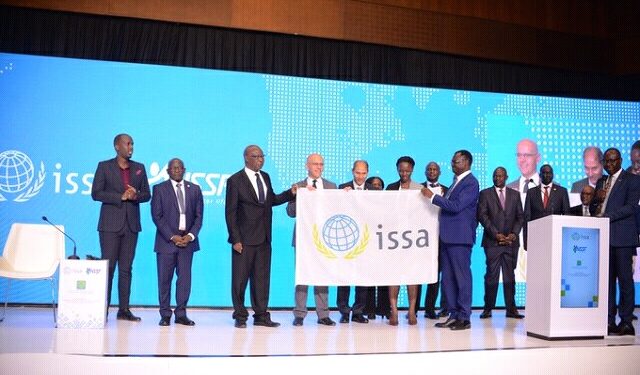Members of the International Social Security Association (ISSA) have come together to chart a transformative course toward the inclusion of the informal sector within the protective embrace of social security systems worldwide.
The International Social Security Association (ISSA), an extension of the International Labor Organization, has been dedicated to enhancing social security services across its vast membership of over 170 states.
During the official launch of ISSA liason office at NSSF head offices in Kampala, Magid Fathallah, the Regional Coordinator of ISSA, mentioned that when discussing challenges, specific groups present difficulties regarding coverage.
He noted that these groups include the self-employed, wage laborers without formal employment contracts, individuals involved in family labor, segments of the informal economy like rural agriculture, fishing, and construction, as well as distinct categories such as internal and international migrant workers, seasonal workers, and domestic workers
In a recent interview with Uganda Radio Network(URN),ISSA Secretary-General Marcelo Abi-Ramia Caetano highlighted the persistent challenge of extending social security to the informal sector, not only in Uganda but in many countries worldwide.
Caetano pointed out that this challenge stems from the unique nature of the informal sector, despite its substantial workforce contribution. He emphasized that leveraging digitization could be the key to integrating the informal sector into social security systems.
Uganda currently provides social security coverage to only 11 percent of its workforce, a notably low figure considering the country’s workforce comprises over 16 million individuals, primarily engaged in the informal sector and agriculture.
While the National Social Security Fund (NSSF) has yet to extend coverage to these sectors, an amended law now mandates their inclusion.
Patrick Ayota, Managing Director of the NSSF, sees the ISSA as an opportunity to learn from countries that have excelled in digitization efforts.
He believes that digitized services, easily accessible through mobile phones, can play a vital role in expanding social security coverage, complemented by innovative strategies witnessed in other nations.
Ayota also noted a positive trend where employers with fewer employees are subscribing to the fund, aligning with the new law’s provisions, signifying growing support for social security in the country.
Drawing inspiration from Kenya’s NSSF, known for its highly digitized processes that collect a percentage of mobile money transactions, there’s a sense that such an approach could resonate well within the informal sector, minimizing the perceived financial burden on its members.
Recent developments in the ISSA include a meeting of member countries in Uganda to exchange ideas on successful social security practices.
During this conference, a significant decision was reached to establish ISSA East and Central Africa regional liaison offices at the NSSF headquarters in Kampala, a move aimed at strengthening cooperation and communication within the region.
As economies continue to evolve, with a substantial portion of the workforce operating outside traditional labor structures, this collaborative initiative signals a pivotal shift in addressing the rights and well-being of millions previously left in the shadows of economic stability.
With strategies poised to reshape the landscape of social protection, this international coalition embarks on a mission to bridge the divide between formal and informal employment, forging a path towards greater security and equity for all.
Do you have a story in your community or an opinion to share with us: Email us at editorial@watchdoguganda.com













